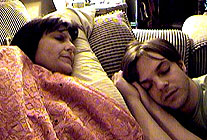|
|
|
|
Tarnation
|
 |
|
There is a scene near the end of Jonathan Caouette's Tarnation in which his mother, Renee Leblanc, dances and raves. She is, by this stage of her life, deeply mentally disturbed. Caouette keeps his camera on this painful spectacle for what seems like an eternity. What is the point of this sequence? To hammer home what, by this point of the film, we already know about Renee? To make us experience what it is like for Caouette to spend time with his mother? To show off his skills as a long-take filmmaker? To plunge us into a filmgoing ordeal akin to Artaud's Theatre of Cruelty? I get the sense that Caouette has little understanding of his own motivation in making this strange and personal testament. It has at least three central topics: the evolution of the filmmaker's gay identity; his path as an underground artist using Super-8 and video to document himself and the cultural scenes around him; and to investigate the tragic life of Renee, a teenage model whose personality was damaged by electro-shock therapy, medication and abuse. Psychic damage is, in fact, everywhere in this film. Renee's parents are portrayed as twisted creatures from a Gothic nightmare. Caouette himself has frequently attempted suicide, and fears he will spiral into depression or psychosis. Both Renee and Jonathan tell tales of rape and abuse inflicted upon them, although it is clearly hard for them to separate false memories from true ones. The key section of Caouette's narration (annoyingly written on the screen in telegrammatic bursts, computer-art style, rather than spoken on the soundtrack) refers to his tendency to 'act out' – a phrase we hear a lot at present in American film, and American pop culture generally. Yet if this is therapy-speak, there is very little self-insight evident at any point of Tarnation. The film is an unpleasant, churning mass of unmastered thoughts, experiences, responses and sensations – thrown at us under the pretext of picturing the process of 'depersonalisation'. But it is a purely symptomatic, not analytic text. Does Caouette regard this personal collage (beefed up with psychedelic effects and a virtually non-stop musical accompaniment) as a gesture of personal catharsis? If so, it manages to resolve none of the serious issues that it raises. Caouette makes a great show of empathy for his mother, but delves very little into the details of her condition and obscure personal history. At one breathtakingly offensive moment, Caouette suggests that anyone who (like himself) grows up abused within a dysfunctional family is likely to turn out gay – and nothing else in the movie contradicts this absurd piece of self-psychoanalysis. Tarnation arrives with an odd promotional tag: "Your greatest creation is the life you lead." For some pundits of the media industry, this film is the fulfilment of the dream once charmlessly articulated by Francis Ford Coppola: "One day, a fat girl in Iowa will pick up her video camera and make a film unlike any we have ever seen." Caouette's combination of low-fi technology, autobiographical content and vaguely experimental techniques have won him access to international attention and distribution. But the result, if gruesomely fascinating, is pretty distasteful. © Adrian Martin July 2005 |
![]()